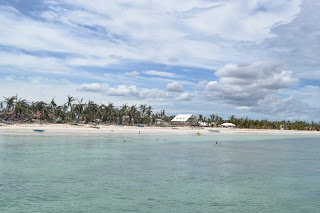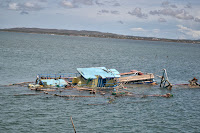Bantayan Island, Haiyan Aftermath
 On board the ferry now bound for Bantayan.
I have mixed feelings. I remember a similar, joyous trip taken a few years
back. My eldest, Rod, was barely a year
old then. It was a leisure trip, one we
took because I've always wanted to go to Bantayan and its famed white
beaches. I was told it's a good
alternative to Boracay with its powdery, white beaches sans the crowd. I've been to Boracay twice before that and so
who wouldn't be lured by the promise of tranquil in a similar paradise? There
was a reference to crabs too being sold at 20 pesos a bucket. Now, who could beat that? And true enough, it was an ideal family trip
despite the long road travel we had to take. It was worth it.
On board the ferry now bound for Bantayan.
I have mixed feelings. I remember a similar, joyous trip taken a few years
back. My eldest, Rod, was barely a year
old then. It was a leisure trip, one we
took because I've always wanted to go to Bantayan and its famed white
beaches. I was told it's a good
alternative to Boracay with its powdery, white beaches sans the crowd. I've been to Boracay twice before that and so
who wouldn't be lured by the promise of tranquil in a similar paradise? There
was a reference to crabs too being sold at 20 pesos a bucket. Now, who could beat that? And true enough, it was an ideal family trip
despite the long road travel we had to take. It was worth it.
When we were approaching the island I'm
filled with a trepidation I could not fully describe. I don't know what I would be seeing. The news and some of the aerial shots
featured of the island in the aftermath of Haiyan looked bleak. It had never occurred
to me that I will be taking a trip back to Bantayan under these circumstances.
It's tourism that drives the island. Despite its being so totally off the beaten
track, tourists (both international and local) go to the place. I know we did, even brought a baby in
tow. And we're like almost from the tail
end of the country as it was.
 The Hagnaya port itself, which is part of
the Municipality of San Remigio was not that devastated. Only a portion of the roof got detached. But as we moved out of the pier, I began to
notice overturned boats and those that sank near the bay. They were another testament to how mighty
Haiyan was. The ferry had to weave our
way between these obstacles which was very much reminiscent of the land trip we
took all the way up to Daanbantayan two days after the typhoon.
The Hagnaya port itself, which is part of
the Municipality of San Remigio was not that devastated. Only a portion of the roof got detached. But as we moved out of the pier, I began to
notice overturned boats and those that sank near the bay. They were another testament to how mighty
Haiyan was. The ferry had to weave our
way between these obstacles which was very much reminiscent of the land trip we
took all the way up to Daanbantayan two days after the typhoon.
More
of the Obstacle Course. Getting around
the island is another obstacle course.
As expected, debris line and block the road. On our way to Madridejos, deemed the most affected
of the three municipalities in the island, it was heart-wrenching to see houses
leveled to the ground. What’s worse than
that was finding out, upon closer look, that amidst the rubble is a family
living underneath. They are making do of
what’s left of their houses. I guess
they think they’re better off that way than staying in cramped evacuation
centers. Next to these makeshift houses
are clothes everywhere being dried in the sun.
It’s a sorry state to look at it makes one wish there is something you
can do to change things.
Chicken
or an egg?
As we drove deeper down, we began to notice damaged poultry houses as
well. In some, they looked totally
abandoned with chickens scattered everywhere.
For the others, we see hastily thrown plastics over the chicken pens to
replace blown off roofs. Damaged or not,
the chickens looked cramped, it was such a pity to look at. Then I remembered reading in a local
newspaper that Bantayan Island is the egg basket of the province. It’s something worth looking at. By the look
of things, there would is a looming egg-shortage. Price of this commodity is bound to go
up.
Bantayan
Church.
One of my favorite places in the island is the Bantayan Church. It holds fond memories for me. We have this photo of then, still-learning-how-to-walk,
Rod and his Tatay with the church as a backdrop. It’s one of our treasured father-and-son
photo. At first glance, it would seem
that nothing happened to the church. It’s
façade still look imposing but when I looked at the roof, I saw that a big
portion of it was totally blown off that the beams are showing. I entered the church and noticed a few
puddles on the floor. The altar looks
majestic still it was comforting. I just
hope they will restore the roofs soon to ensure that the inside would remain
preserved.

 No Water and Electricity. Visiting the Municipality of Bantayan, which is basically the "market hub" of the island, we noticed that the stores are opened and that business seems back on its feet. We were there four days after the typhoon struck. Since electricity was out, a lot were looking for ways to charge their mobile phones. We spied long queues outside of stores that had generator sets and offered charging services for a fee. In one of the resorts there we saw a sign that read, "Accepts charging @ 100 pesos." That's like more than half already of the minimum monthly electricity fees charged by the local power company.
No Water and Electricity. Visiting the Municipality of Bantayan, which is basically the "market hub" of the island, we noticed that the stores are opened and that business seems back on its feet. We were there four days after the typhoon struck. Since electricity was out, a lot were looking for ways to charge their mobile phones. We spied long queues outside of stores that had generator sets and offered charging services for a fee. In one of the resorts there we saw a sign that read, "Accepts charging @ 100 pesos." That's like more than half already of the minimum monthly electricity fees charged by the local power company.
 There were long lines as well for water. Electricity drives the local water systems. With that out, water distribution is basically out as well. Water tankering is provided by the municipal LGUs and the people line up for them.
There were long lines as well for water. Electricity drives the local water systems. With that out, water distribution is basically out as well. Water tankering is provided by the municipal LGUs and the people line up for them.

 No Water and Electricity. Visiting the Municipality of Bantayan, which is basically the "market hub" of the island, we noticed that the stores are opened and that business seems back on its feet. We were there four days after the typhoon struck. Since electricity was out, a lot were looking for ways to charge their mobile phones. We spied long queues outside of stores that had generator sets and offered charging services for a fee. In one of the resorts there we saw a sign that read, "Accepts charging @ 100 pesos." That's like more than half already of the minimum monthly electricity fees charged by the local power company.
No Water and Electricity. Visiting the Municipality of Bantayan, which is basically the "market hub" of the island, we noticed that the stores are opened and that business seems back on its feet. We were there four days after the typhoon struck. Since electricity was out, a lot were looking for ways to charge their mobile phones. We spied long queues outside of stores that had generator sets and offered charging services for a fee. In one of the resorts there we saw a sign that read, "Accepts charging @ 100 pesos." That's like more than half already of the minimum monthly electricity fees charged by the local power company. There were long lines as well for water. Electricity drives the local water systems. With that out, water distribution is basically out as well. Water tankering is provided by the municipal LGUs and the people line up for them.
There were long lines as well for water. Electricity drives the local water systems. With that out, water distribution is basically out as well. Water tankering is provided by the municipal LGUs and the people line up for them.
Leaving the Island. We were able to make initial assessments and gathered data that was available at that time. Once again we wished there were more data but we were grateful for what we were able to gather. When we got to the port in Sta. Fe, we found out we have a hard time getting a ticket for the next available ferry ride. There were a lot of vehicles queued up that the slot for vehicles are all taken up. We had to resign ourselves that we had to take the last ferry out. It meant waiting for four hours or so. And “or so” it was. We’re supposed to take the ferry at 6 PM but the loading took a looooong time. We ended up boarding it at over 8 PM. The crossing was quick. It was the land trip back to Cebu that took longer. We made it back at half past 1 AM. Vincent and I were grateful for the “pause time” we had at the pier. The sea was calm and the sea breeze heavenly. It soothed our tired body and spirit.
Some photos from happier days in Bantayan 7 years ago:








Comments